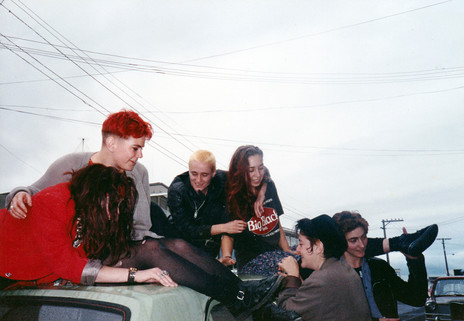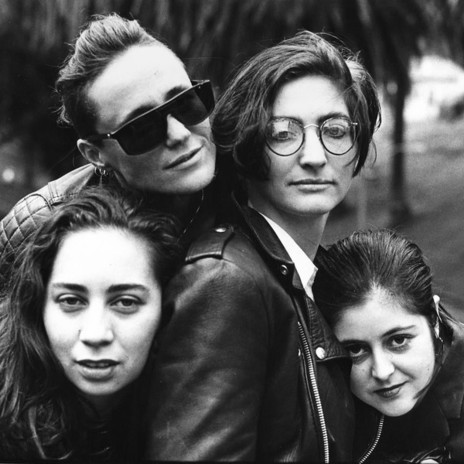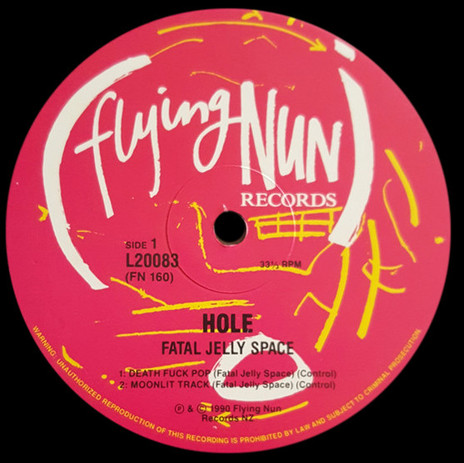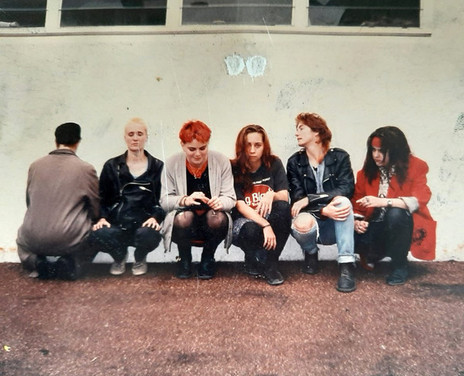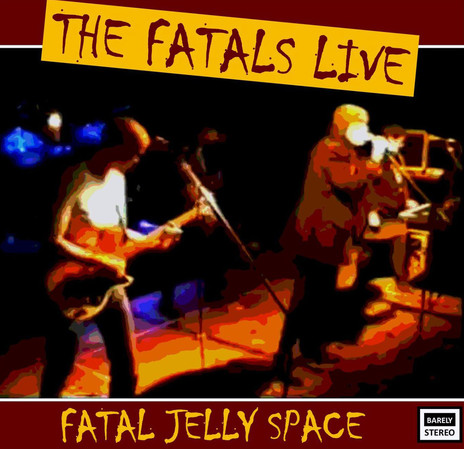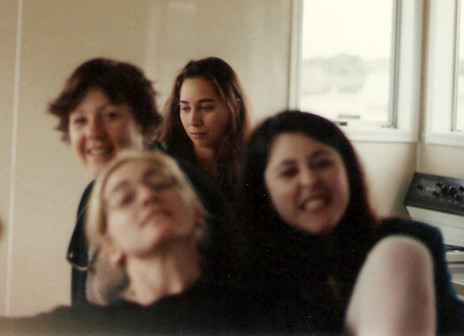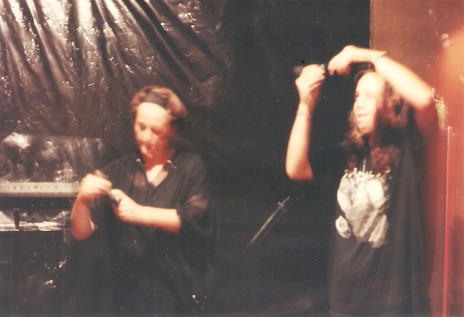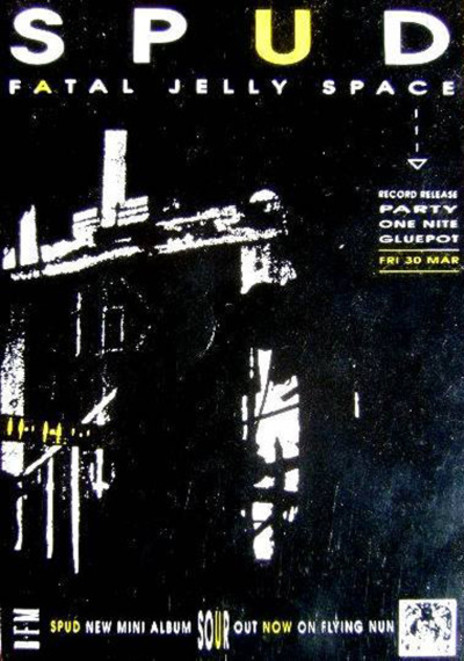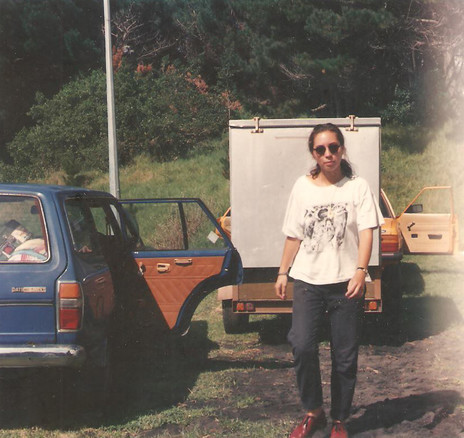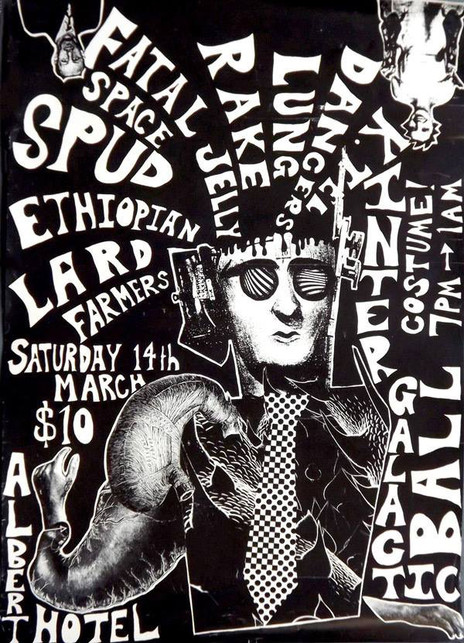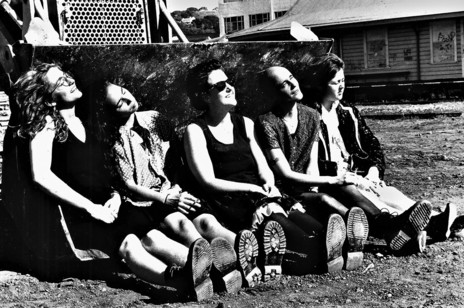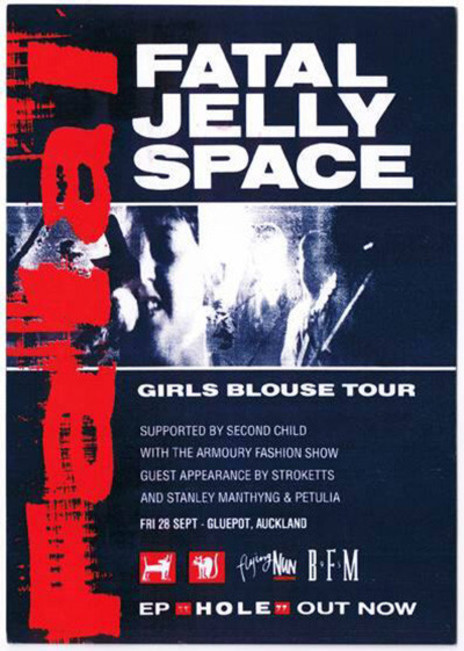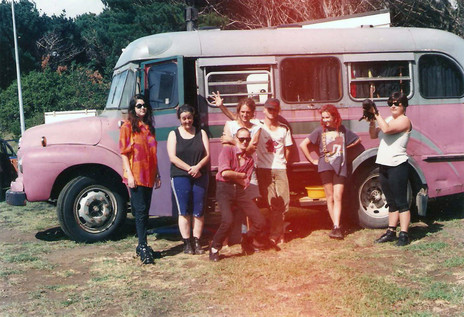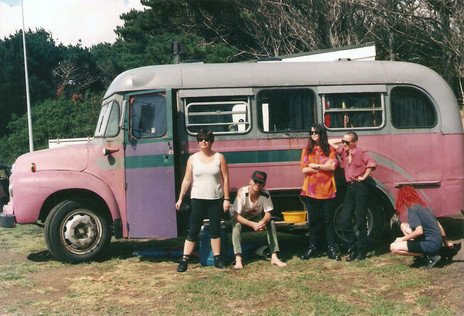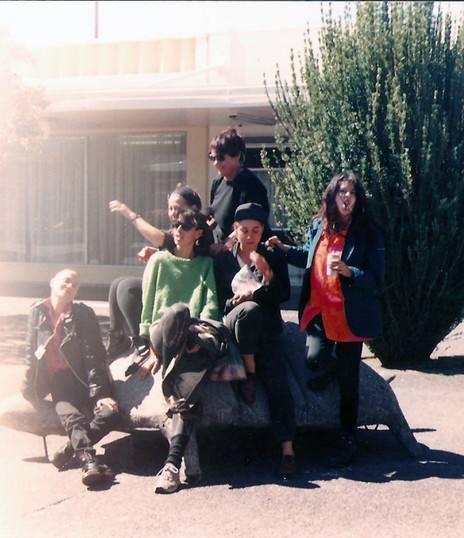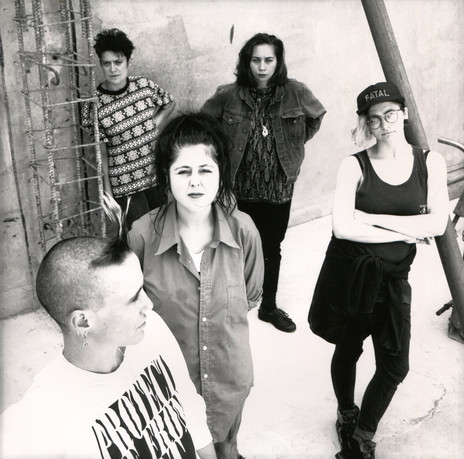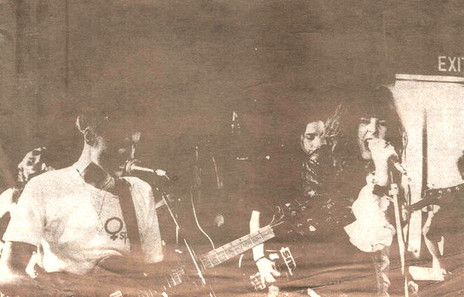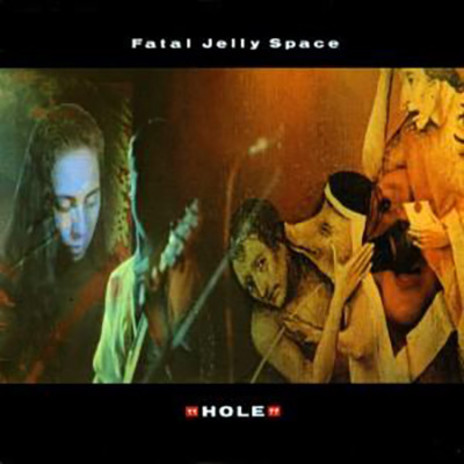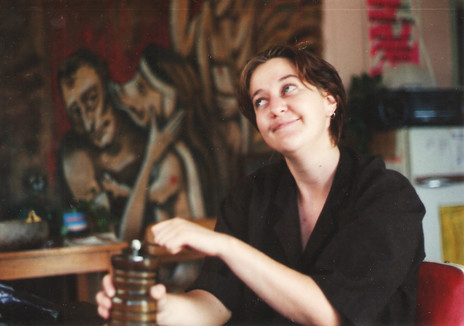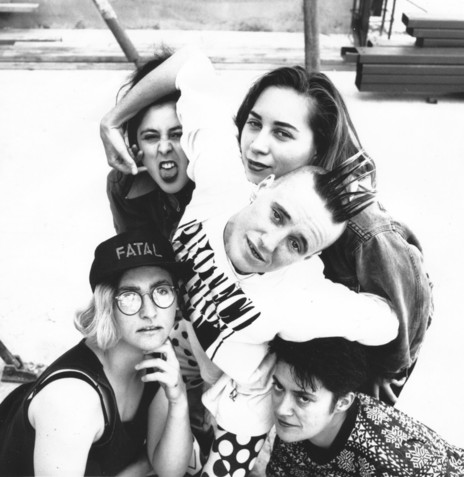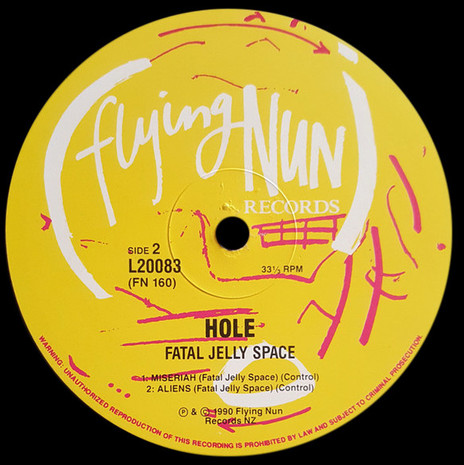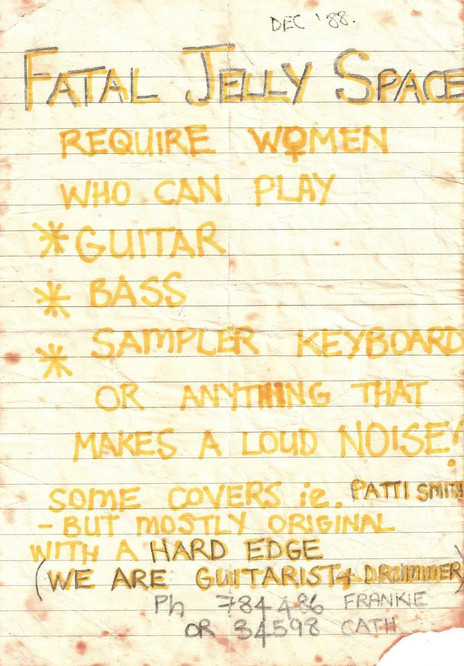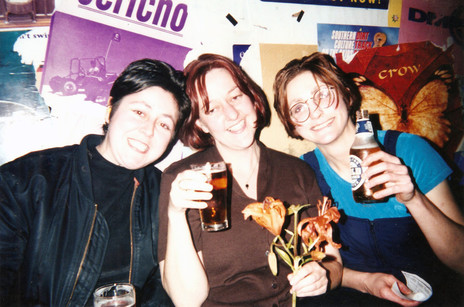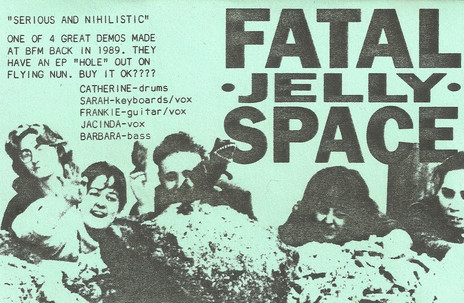“When Frankie heard I’d bought a drum kit, she suggested a jam,” says Cath. “She turned up at my apartment with her guitar and amp. She was very supportive and encouraging to a learner, and I’m forever in her debt for that. Then we had a jam with Flick, the bass player in Cassandra’s Ears. It was the three of us who came up with the name Fatal Jelly Space … I think we all supplied a word. Flick had other priorities, so Frankie and I decided to advertise for other members.”
Jacinda Klouwens, who had been in The Honeys and was in the Groovy Girls, saw the ad in a music store looking for a vocalist (and bassist) for an all-girl band. “I had auditioned for a couple of other bands but this time it all fell into place, there was an instant feeling of unity/collaboration and vision.”
Each musician brought unique elements to the band.
She and fellow Groovy Girls band member Rachel “Groover” Smith joined along with keyboardist Sarah Cole (a friend of Frankie’s), and bassist Barbara Morgan, who deftly handled being in both Fatal Jelly Space and Second Child until 1991.
Each musician brought unique elements to the band to shape a sound that set them apart. Of Morgan, AudioCulture writer Michael Canning said she is “an incredible musician. One of the best players of her generation in my opinion.” Sarah Cole’s keyboard skills added an important spectrum to their sound, heard in the haunting piano lines which create the atmosphere of ‘Moonlit Track’. On his Elsewhere website, Graham Reid writes of “the wonderful Frankie who – although tattooed and with a shaven head – was far from a ferocious personality off-stage.”
Fatal Jelly Space’s first live gig was at the Albion Hotel in Hobson Street in 1989, albeit without Jacinda and Rachel who were in Wellington at the time. Their first all-member show was at The Rising Sun with the Ministry of Compulsory Joy. They quickly picked up a following based on their fierce live performances, and soon became one of Auckland’s busiest gigging bands, playing alongside Headless Chickens, Jean-Paul Sartre Experience, S.P.U.D., Bailterspace, Straitjacket Fits, Andrew Fagan (Jacinda’s teenage self was particularly happy about this one), Solid Gold Hell, and Stanley Manthyng.
CATH O’DWYER: “The Fall invited us back to their hotel and [sat] around like someone had died.”
They supported international acts The Fall and Babes in Toyland, and Jacinda played solo shows supporting Lydia Lunch at The Gluepot, Kristen Hersh at the Mercury Theatre, and the Big Day Out. Ventures outside Auckland included university orientation tours, the Art Gallery music festival (AMPiTHEATRE) in New Plymouth, the Composing Women Festival at the Wellington Town Hall, and their Big Girl’s Blouse national tour in 1990 to promote their EP, Hole (Flying Nun).
When asked about some of their most memorable live shows, Cath says, “The Fall invited us back to their hotel and proceeded to sit around like someone had died. Mark E had fired the guitarist and keyboard player directly after the gig!”
Fatal Jelly Space only released one record, the Hole EP, but it stands up as a document of the band’s power, and is one of the great unsung New Zealand EPs of the 1990s. Engineered by Rex Visible and Matthew Heine, and co-produced with Visible at The Lab Recording Studio, the record showcases a band capable of both beauty and ferocity; each of the four tracks exemplifies the magic of intelligently wielded dynamics.
Frankie Hill (backed by members of FJS) also appeared on Shrew’d – A Compilation of New Zealand Women’s Music, released by Flying Nun in 1992. The compilation features some of the most influential alternative female artists of the 1980s and 90s: Jay Clarkson (Breathing Cage), Kaye Woodward (The Bats), Norma O’Malley (Look Blue Go Purple), Sandra Bell, Kath Webster (Look Blue Go Purple), Maryrose Crook (The Renderers), Denise Roughan (Look Blue Go Purple, The 3Ds, Ghost Club) and many more.
Despite the DIY vibe of the 90s, those who were starting to gain recognition were also realising the value of having a manager. The first person in this role, Suzanne McNamara, approached Flying Nun to sign them, “and Roger Shepherd agreed – if we could get the QEII arts grant. I applied for the grant, got approved, and Flying Nun matched the dollars we got. Sarah and I were working at TV3 at the time, so we did this cool video application – and we were successful.
“Once the record was made, I organised a tour of New Zealand that we called The Girls’ Blouse Tour … I remember having a lot of coins after each show and having to go to the bank or dole it out for food. The camaraderie and friendship was pretty special.
“Our marketing was limited to the student radio network and posters. There was no appetite in New Zealand from commercial radio to play alternative music – unlike now, where there’s a New Zealand music month and the likes. In some ways it was quite isolating and you really did feel like you were forging a different path with music at the time.”
It probably goes without saying that Fatal Jelly Space sparked curiosity for being an all-female band, although their musical prowess spoke for itself. Regarding the question of whether it was a conscious decision to be an all-woman band, Cath says, “Yes I think so. I don’t think the kit would have ever left my bedroom otherwise. It was great. We got lots of gigs and I got to grow up in public as far as my playing was concerned.”
Jacinda says, “My first musical endeavour was an all-girl band at school. I went to a Catholic girls’ school and we used to practise in the school gymnasium with the blessing of the head principal who was a nun. The idea of an all-girl alternative/punk band started there. There weren’t any girl bands around – that I knew of – that played the music I was inspired by.”
Did being an all-woman band affected how audiences and the industry reacted?
Cath: “If we were mentors to other women who wanted to play music, then great!”
Cath: “Yes, it definitely had an impact. Lots of women’s band questions. I think we were all strong individuals with a variety of quirks and eccentricities between us. We weren’t spokespeople for womankind … we were young women playing music because we wanted to. If we were mentors to other women who wanted to play music, then great! I think the mindset was, ‘we’ll do whatever the hell we want’ … I still think that way.”
Jacinda: “Definitely. We weren’t taken seriously in the beginning for that very reason.”
Suzanne: “To be honest we didn’t really think too much about being all women. We were all feminists, and just believed in ourselves and our capabilities, and I don’t think we thought much about men versus women. FJS had a pretty unique sound and were an alternative sound to what was on the scene from other women bands.”
All good things sadly come to an end. The band broke up in 1994, and as can be expected, there are various reasons, but it seemed the right time for all involved.
Jacinda: “Sarah resigned, and it left a gap creatively and personally for me. It was time to move on.”
Cath: “Jacinda decided she wanted to do something else and eventually went to Australia. It wasn’t going to be the Fatals without her, so we called it a day.”
Jacinda: “I’m proud though of our achievements from that time, it was an absolute blast! We are all still in touch and, at the end of the day, it was actually something pretty special.”
Cath: “That was a great, crazy period of my life and I have lifelong love and affection for the women in the band, including Suzanne. Also for Fred E Rick, our long-term sound guy, and Brigette Hunt, our lighting woman extraordinaire.”
Suzanne: “I’m proud of the record and videos we made and all the gigs we played. It was a really awesome time and hard to pinpoint the favourite times.”
Most of the former Fatals have continued along creative paths.
Since the band broke up, most of the former Fatals have continued along creative paths. Barbara played with Andrew Fagan in Lig in the UK and New Zealand from 1995 until 2008. Frankie plays solo shows around Waiheke Island, and while Jacinda hasn’t continued with music, she created a cool animated video for the band’s track, ‘Dark Is Rising’, in 2015.
Happily, a live set – The Fatals Live – has since been posted on Bandcamp. Also, songs from the unreleased EP engineered by Matthew Heine at The Lab – titled In the Room of Forgotten Songs – were released in 2019 on Spotify and Apple Music.
As befits this digital era, maybe the last word should be taken from Fatal Jelly Space’s Bandcamp page: “Fatal Jelly Space was a New Zealand band based in Auckland with an all-female line up. We existed from 1989-1994 and decided to cease when Jacinda (vocals) stated that she wasn’t angry anymore and wanted to do something else. Much later, our livers thanked her.”
--
Read more: Fatal Jelly Space – white-collar Johns call me crazy, by Sarah Cole
